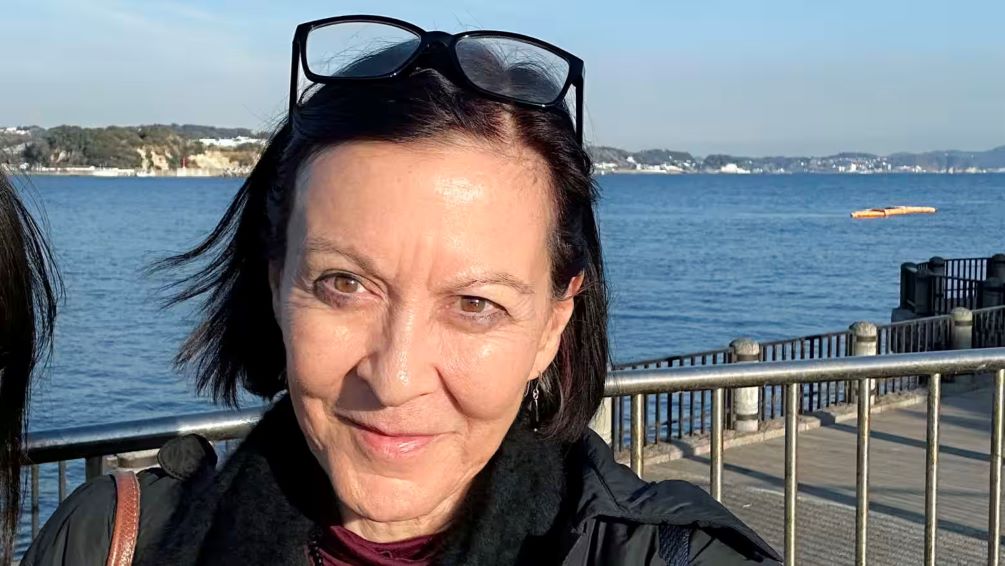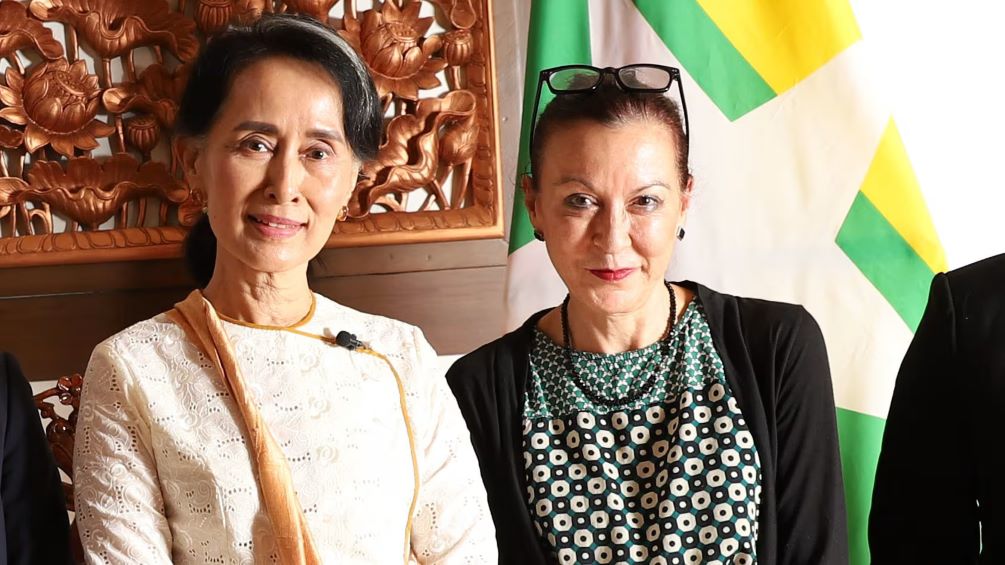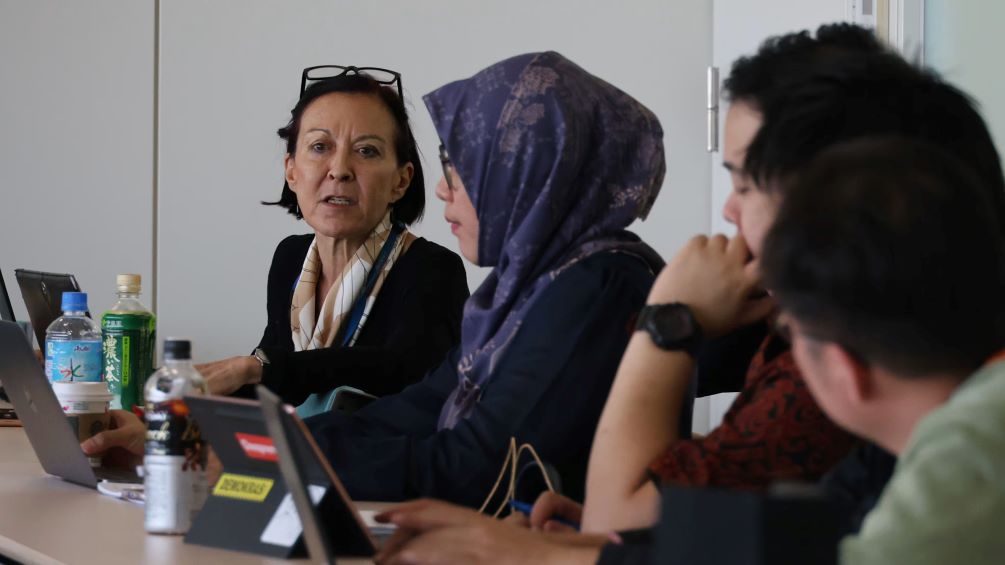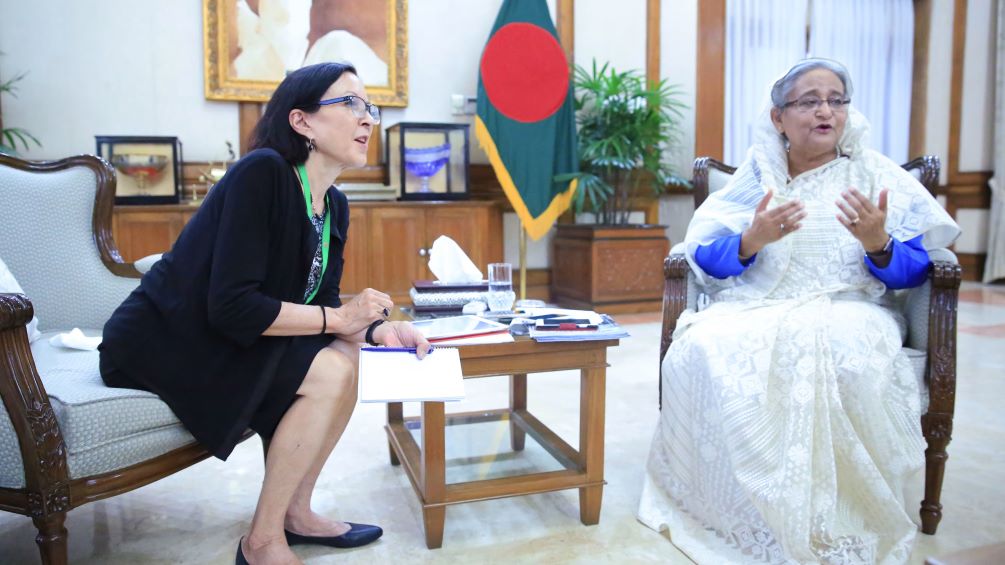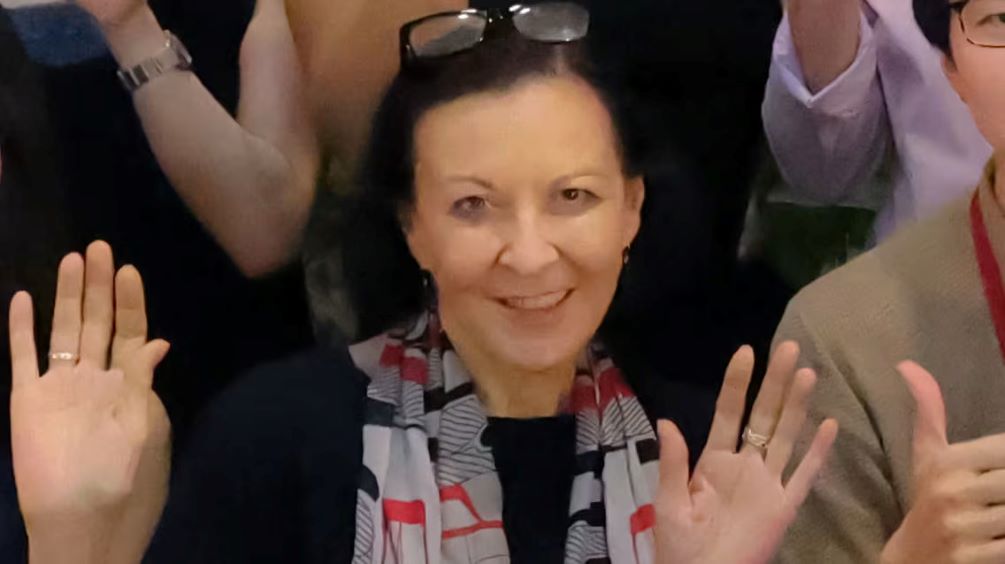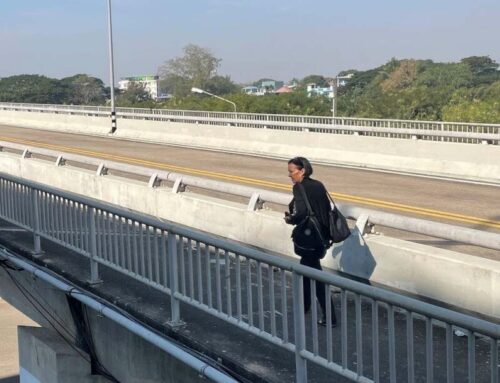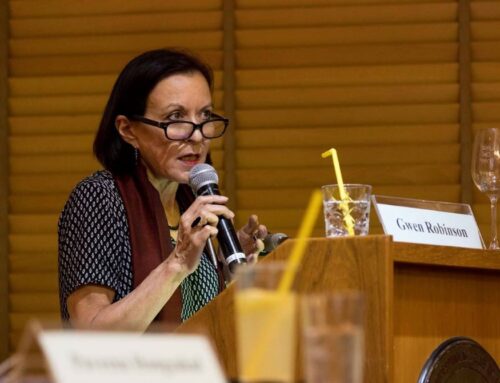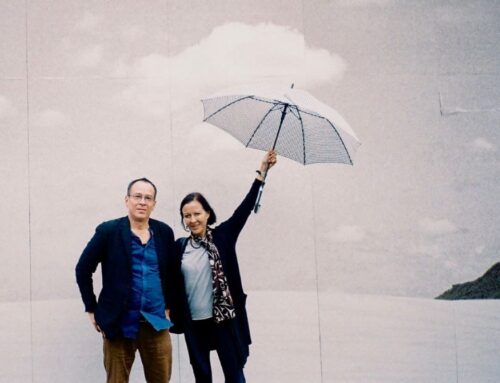Gwen Robinson, a driving force in Asia journalism, dies at 65
Trailblazing correspondent and mentor instrumental in shaping Nikkei Asia’s global presence
{1st Photo Caption: Gwen Akiko Robinson in Enoshima, Japan, in 2023. (Photo by Reiko Cirilli)}
Obituaries
Gwen Robinson, a driving force in Asia journalism, dies at 65
Trailblazing correspondent and mentor instrumental in shaping Nikkei Asia’s global presence
KEN KOYANAGI
March 31, 2025 09:00 JST
TOKYO — Gwen Akiko Robinson, Nikkei Asia’s Bangkok-based editor-at-large, has died at the age of 65 after a battle with cancer.
Throughout her life, she was a “walking internet router,” keeping in touch effectively with every contributor and journalist colleague in Asia and elsewhere. She had friends to hang out with in every city she visited. She enabled Nikkei Asia to take advantage of her vast human nexus to develop its reporting team and contributor pool, as well as to promote Nikkei as a global media outlet.
Gwen’s collaboration with Nikkei’s venture to develop a new international English-language news platform, called Nikkei Asian Review at its commercial launch in November 2013 and later renamed Nikkei Asia, started when she answered a call from me in May 2013. She was at her apartment in Yangon, which she rented as her base camp for Myanmar coverage for the Financial Times. At the time, she was the British newspaper’s Bangkok bureau chief.
I had been assigned to lead a project at Nikkei’s Tokyo headquarters to plan, launch and develop a new English-language news platform. At the time, I was struggling to figure out how to build a network of locally based reporters and editors across East, Southeast and South Asia.
Having known each other since the early 1990s, I casually called her up just to seek some advice on potential candidates and contributors for our new publication. As we chatted, it turned out she had just decided to leave the FT to start a new career in Bangkok, mainly as a researcher at the renowned Chulalongkorn University.
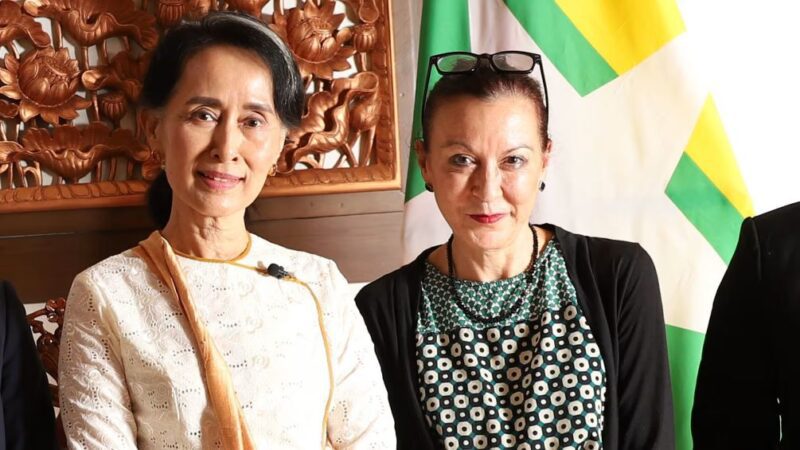
Robinson, right, is photographed with Aung San Suu Kyi, then Myanmar state counsellor, during an interview in Naypyitaw in September 2017. (Photo by Shinya Sawai)
I could not blow such a divine opportunity. A few weeks later, I was in Bangkok pitching our project in person to her in an attempt to get her to join our team. It worked. She was fascinated by the idea of starting a new media outlet that would be based in Asia with an Asian perspective. I proposed she take a part-time editor role from Bangkok so that she could divide her time between Nikkei and Chulalongkorn. She agreed.
That was the moment when things started rolling for the Nikkei Asian Review. In quick succession, we managed to hire editors and reporters across the region — in places such as Hong Kong, Taipei, Jakarta, Ho Chi Minh City, New Delhi and, of course, Bangkok.
Gwen also played a critical role in the initial promotion of the new publication. She often dragged both editorial and marketing staff to conferences and talks where she was moderating panels, taking us to Myanmar, Thailand, Indonesia, Hong Kong, the Philippines and other locations. We would set up a display stand at these events, handing out our magazine and explaining what we were trying to achieve. Gwen was always the most energetic among our team members despite being far more senior than most of us.
She introduced us to numerous business leaders, investors, policymakers and journalists, gradually helping us to gain name recognition among those influencers.
In fact, this was the second time she had agreed to help Nikkei build an international English-language news publication.
The first was in 1990, when Nikkei was planning to turn its English-language Nikkei Weekly — previously Japan Economic Journal — into a daily and invited Gwen, then working as the Southeast Asia correspondent of an Australian newspaper, to join its newsroom to prepare for the daily edition’s launch.
But the project was killed abruptly in 1993 after the bursting of Japan’s great asset bubble. This prompted Gwen to leave Nikkei and move on to The Times of London and then to the Financial Times.
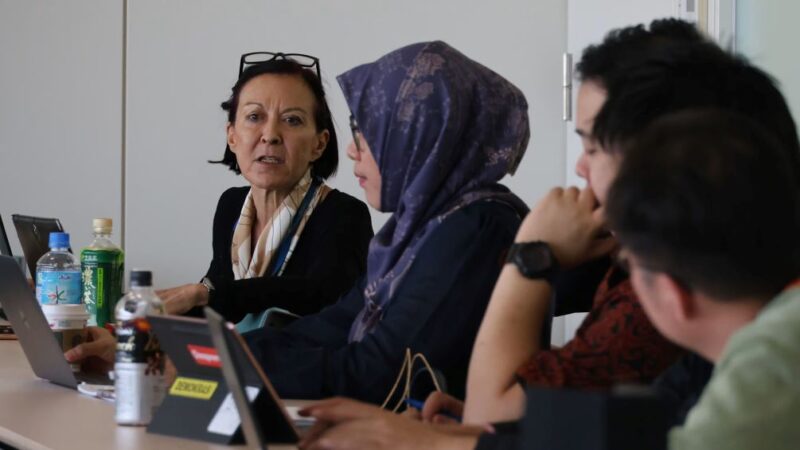
Robinson, far left, speaks with reporters at Nikkei headquarters in Tokyo in 2023. (Photo by Ken Kobayashi)
The daughter of a Japanese mother and a British-Australian father, Gwen always seemed to have a special passion for helping Japanese media to get heard around the world, so that project’s cancelation was very disappointing for her.
It seems that sense of lost opportunity back in the early 1990s led her to invest her time into Nikkei’s subsequent English media venture 20 years later. This time around, the project has survived headwinds and is making great strides forward.
Before rejoining Nikkei, Gwen built a successful career at the Financial Times between the mid-1990s and 2013 while posted as a correspondent to Tokyo, Jakarta, Washington and Bangkok among other locations. She also worked at the FT’s London headquarters as foreign desk editor and then as commentary editor.
In her last posting at the FT Bangkok bureau, which stretched from 2011 till the summer of 2013, her coverage of Myanmar stood out among all major news publications. She managed to build trust both with high-ranking generals from the country’s ruling military, known as the Tatmadaw, and also with leaders of Aung San Suu Kyi’s rising National League for Democracy (NLD). Many business people in Myanmar — both Burmese and foreign — regularly hanged out with her in Yangon.
After joining Nikkei, Gwen continued to coach younger reporters, come up with cover story ideas, break stories on Myanmar, Thailand and other places, and score exclusive interviews with such figures as Suu Kyi in Myanmar, Sheikh Hasina in Bangladesh and Joko Widodo in Indonesia.
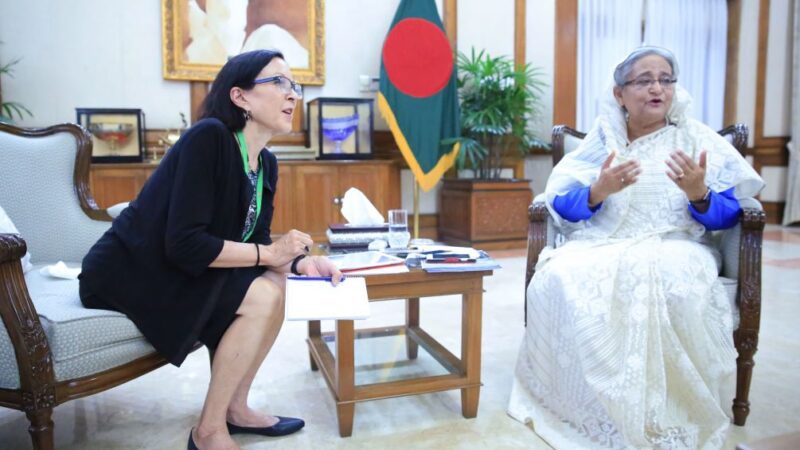
Robinson, left, speaks with Bangladesh’s then-prime minister, Sheikh Hasina, in Dhaka in 2018. (Photo by Akira Kodaka)
Gwen also backed democratic capacity building in Myanmar after the political and economic reforms that began in 2011, networking with repatriated Burmese who had returned to their homeland from Western universities and corporations to help develop legal and other social institutions.
After Nikkei Asian Review debuted its print edition with a cover story featuring Myanmar in November 2013, she took me to NLD gatherings in Yangon featuring aspiring potential legislative candidates. We gave them advice on how politicians should handle news media in a democratic environment. We asked them not to tell them lies and not to bribe reporters.
No matter where she was, Gwen would never waste evenings, using the time to catch up with friends. She loved vegetables and seafood, and a bit of alcohol — usually white wine with plain soda water.
In Tokyo, she would always ask me to take her to one of her favorite izakayas. When I, as a Nikkei reporter, interviewed then-FT Editor-in-Chief Lionel Barber in Tokyo in 2011, his eyes were red. It turned out that Gwen, still an FT correspondent in the city, and Lionel had been drinking deep into the previous night. She was such an authentic old-school journalist, who would be always be happy to talk with colleagues on issues and gossip over drinks late into the night.
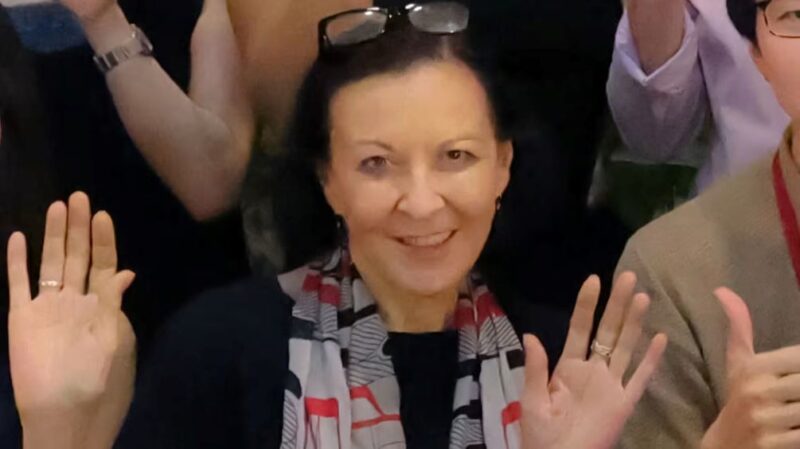
Robinson with Nikkei Asia colleagues in Bangkok in 2023. (Photo by Ken Kobayashi)
She was always a pivotal figure in the community of international journalists in Bangkok. She served as president of the Foreign Correspondents’ Club of Thailand from 2019 to 2021 and was on its board until her final day.
She was absolutely a night person, and did not think twice about sending out predawn emails. If I proposed dinner at 7 p.m., she would beg to move it later, saying “7 o’clock is almost lunch time.”
Gwen was a resolute smoker, declaring she would rather die young than succumb to pressure or advice to quit. When I quit smoking and would no longer accompany her for ciggie breaks, she jokingly criticized me for defecting from the smokers’ alliance. When I urged her to quit for her health, she would say, “No worries.”
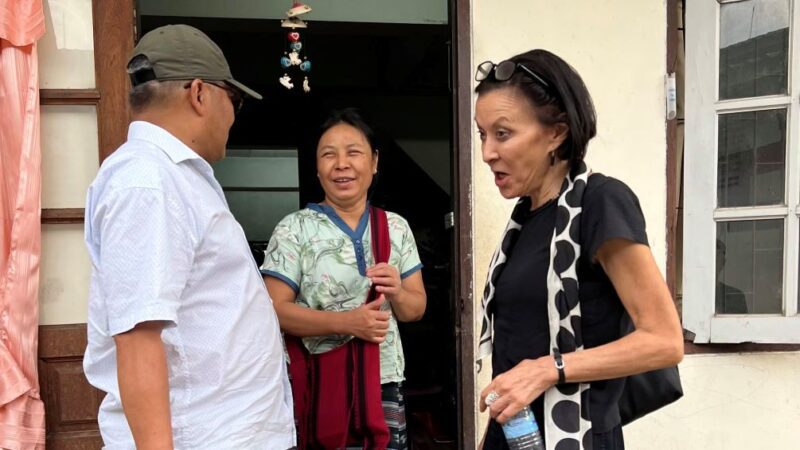
Robinson, right, interviews Myanmarese living in Mae Sot, Thailand, in 2024. (Photo by Toyoaki Fujiwara)
One of Gwen’s most incredible feats was to pull together (using her abundant contacts and knowledge) a comprehensive cover story on the Feb, 1, 2021 military takeover in Myanmar. It took her less than two days. Her last piece for Nikkei Asia was an essay on fully automated Japanese hotels and trains for the “Tea Leaves” column that she herself launched and edited.
Gwen was much loved by all colleagues and friends due to her unique character that comprised strength, humor and an infamous sense of unpunctuality. She will keep energizing all of us through her assurance of “No worries.” She shall be loved by all of us just as much from now on.
Perhaps it is fitting that Gwen left us on March 29 — the day after Myanmar again became the focus of the world’s media due to the devastating earthquake. No doubt, she’d have been on top of the coverage had she still been with us.
Source Link: NIKKEI ASIAN REVIEW
Related Articles:
Gwen Akiko Robinson, RIP – FCCT
Gwen Akiko Robinson
(12 March 1960 – 29 March 2025), RIP
Gwen Akiko Robinson, RIP (see full obituary) – FCCT
Gwen Akiko Robinson
(12 March 1960 – 29 March 2025), RIP (see full obituary)
Wake for Gwen Robinson, FCCT past president and Nikkei Asia editor at large – FCCT
Friday, 4 April 2025 at 18:30.
Wake for Gwen Robinson, FCCT past president and Nikkei Asia editor at large
The FCCT will be open to all for this celebration of the life of Past President Gwen Robinson, who passed away in Bangkok early on March 29.
